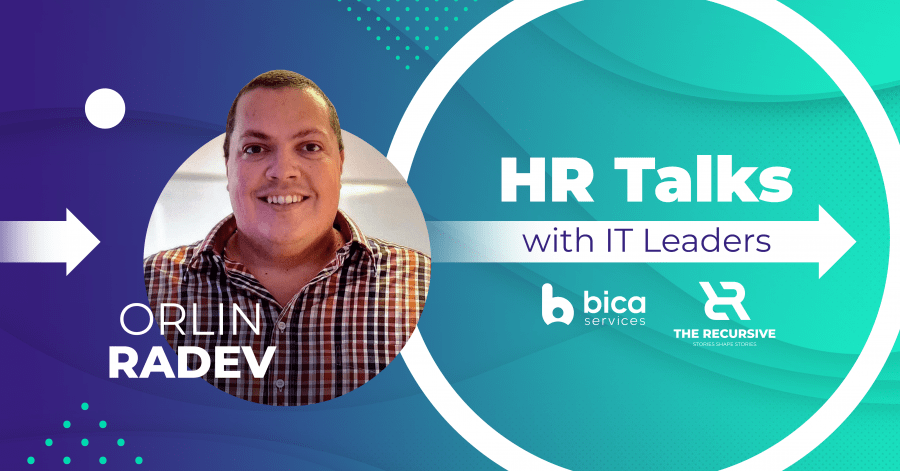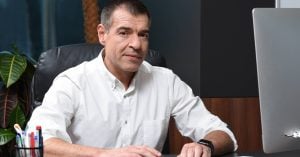HR Talks with IT leaders is a campaign organized in collaboration between The Recursive and BICA Services, one of the most prominent HR service providers in the Bulgarian market. Our goal is to give more visibility to the knowledge of how great tech teams are built. Every week, we will meet with accomplished entrepreneurs and managers who will share their personal experience and what’s their approach to leadership, communication, hiring, talent development, and much more.
Today, we meet you with Orlin Radev, a serial entrepreneur, currently founder and CEO of Bulgarian e-mobility startup Ampeco. Since 2018, the Sofia-based startup has been providing EV charge point management platform to companies that want to start or scale a charging business. The goal of Ampeco is to provide a fast and efficient solution that enables businesses from all sectors – from e-mobility enterprises and gas stations to restaurants and hotels. Ampeco has grown to serve customers all over the world including the UK, Western and Southern Europe, Asia, and the Americas.
+++HR Talks with IT Leaders ep. 1: Boyko Iaramov on giving back, transparency and leadership
+++HR Talks with IT Leaders ep. 2: Radoslav Georgiev on the art of scaling your company fast
+++HR Talks with IT Leaders ep. 3: Stoyan Angelov on successful team collaboration
You’ve led many companies over the years – what is the most important lesson you learned about leadership?
Since my first company, which we founded when I was still in high school, I have always been in a position to lead or manage people. At first, I did not see myself as so much of a leader or gave any thought to it. With time, I learned that being able to actually inspire people and to empower them is crucial.
I realized that you need to be a strong believer and lead people by example. If you want people to be dedicated and to be passionate about what you need them to do, you must do the same and feel the same way about your startup idea.
Another very important lesson I learned is that you should encourage and support others and recognize their achievements because, in the end, you’re not going to pull off the weights, you’re going to want others to do it and they deserve the praise. This is something everyone needs to feel motivated. Encouraging your team and supporting them is probably the best thing a leader can do.
On Ampeco’s website, you state that you are looking for a scaleup mentality and getting-things-done attitude – how do you recognize such people during the hiring process and help current team members develop this mindset further?
On our way to expansion, we look not only for the skillset for a particular position but also whether a person is a good fit and we do that by looking for traits that we find important for the company culture.
At the top of the list of traits, what we are looking for is open-mindedness. We want to build an open culture in our company – we want people who are curious and wouldn’t be afraid to share their minds and ideas. In a sector where things are moving very quickly, one has to be curious, to want to learn, especially when you do something like what we do. It is important for people to bring their own experience while being able to adapt, learn, be curious, and progress.
During interviews, we ask about previous experience, from the answers and attitudes we can see whether a person is curious and is going to learn quickly. A lot of the time when we talk to people, we would paint a realistic picture of our company, what the team is like, what our values and the mission are. We try to make interviewees position themselves maximally in the environment and let them see if they’re a good fit. Do they feel like they will fit well there? Do they feel like they will prosper and will be accomplished in such environments? And often, we see that people have better judgment than us.
In terms of the getting-things-done attitude, it comes with us with the process that you as a leader, along with the rest of the team, have set up.
For us, it’s about setting up an evaluation process where you are encouraging people to achieve things rather than put them in working hours. On the contrary, if it’s important to you to clock in at 9 am and scope out at 6 pm, rather than evaluate what job or what things have been accomplished during the day, then you’re not going to set up a culture where results are valid.
What’s your approach to giving feedback?
I always rely on open communication and giving feedback on the spot after something has happened, no matter if it comes to praising someone or discussing a mistake. Don’t wait for six months to say something because, by that time, the mistake could have been corrected, depriving you of the opportunity to navigate around, and see what is really going on.
We embrace our failures – for example, one of the funny KPIs that we have is the number of things that have been messed up. What we do is we cast them and discuss why something happened, but without blaming someone for it, because there are real and constructive reasons why each problem occurs that are often outside an employee’s control.
Can you tell us a bit more about your efforts in prioritizing mental health? How do you do it on a practical level?
Before I go to the practical level, I need to clarify certain beliefs. I don’t like it when I see a startup or any company refer to themselves as a family and then they praise the “work hard, play hard” mentality. It creates a false impression that work is the most important thing in life. Work is all about what a person would like to accomplish for themselves and it definitely does not comprise our entire lives.
That is why, from the very beginning, we have a strict policy on workloads. The fact that the company you work for is a startup shouldn’t mean that you’re overworked. First of all, overworking someone eventually leads to low motivation. And if it goes for a while, it is also likely to lead to burnout. Even in the shorter term, when you’re overworked, you’re not doing your best.
You’re doing your best when you’re inspired, when you have the time to do your job. That is why we don’t tolerate working overtime. In fact, another KPI we have is extreme sessions.
We log every time someone had to work outside of their regular working hours – I say outside of their regular schedule, because someone may be working from noon to midnight because they just don’t want to wake up in the morning. And this is fine. But if they had to work when they didn’t plan to work, just because something was urgent, then this is something that has to be accounted for. In such situations, we do a discussion to see why this happened and what we can do so that we can avoid it.
Another thing I want to stress on is that people have to have a feeling of accomplishment both in their work and in their own personal life to be happy and productive. If you don’t have the time to spend with your family, or to take your kids to school, this creates stress and inconvenience. For this reason, we have flexible working hours, which means every employee defines their own working hours. And the reason for that, as mentioned, could be just because of your chores, or other things outside of work that you need to do. But it could be as simple as the fact that you just don’t function well in the morning. You don’t have to start at 9 am when you start being productive after 12 pm. Defining our working hours helps a lot to not overwork.
This model also stimulates a shared understanding across the company. It is not something that you make an exception for, everyone has to be on board and knows that they have to have a good work/life balance. It goes for founders as well, because burnout, I think, is quite a common phenomenon we see in founders as they’re overly motivated, fixated on the company’s success, and they’re willing to do more. Still, one needs to acknowledge that overworking is not good for their company. Founders need to embrace an understanding that by taking enough rest, they are doing the best for their business.
In the second part of this interview, we explore Orlin Radev’s tips on internal processes, setting up company culture and how he would measure his success as a leader in the long term.








